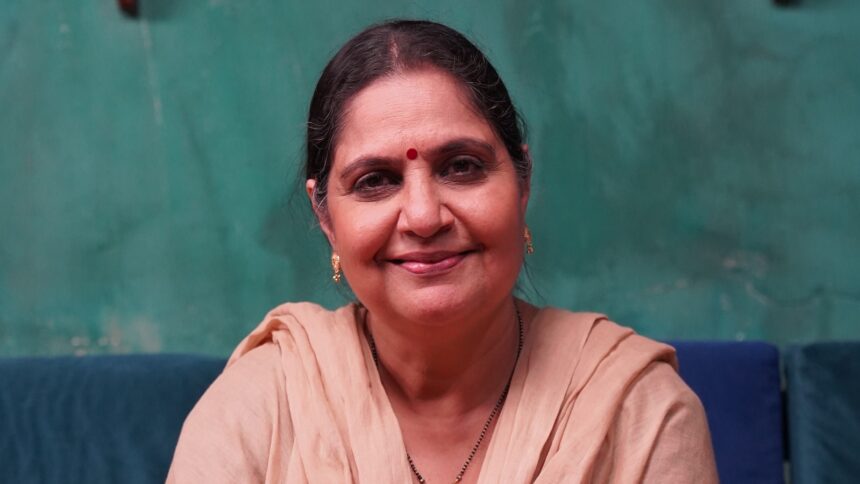From Meenakshi Mathur in Hum Paanch to Jayshree Parekh in Khichdi, Vandana Pathak has portrayed numerous memorable characters in her three-decade-long career. Ask her which role she relates to the most, and the versatile actor quickly replies, “Every character you play has a bit of you in it.”
In a candid conversation with , Vandana — — who is returning on the big screen on May 9 with a Gujarati comedy, — spoke about her new film, her journey in the industry, embracing age, navigating stereotypes, and prioritising mental well-being. Edited excerpts below:
Vandana Pathak: I began acting as a child artist in 1979 in a play, but then I took a break to complete my education. I graduated, completed a diploma in dramatics, and began acting professionally in 1985. My first play was a Gujarati production in titled Sparsh, which focused on rehabilitating leprosy patients. It won state awards, and I was honoured with the Best Actress award. That’s where my theatre journey truly began. From there, I started working in television for Doordarshan and gradually built my career. So, while I did act as a child, my professional journey began in 1985.
Vandana Pathak: It wasn’t a deliberate break. My father-in-law was unwell and living with us, and I wanted to be there for him. At the time, I was working on a show called Manmohini, and when I informed the team, they were very supportive and tried to adjust the schedule. Sadly, he passed away. Soon after, I received an offer for a Gujarati film. Since the commitment was brief, lasting only 12 to 14 days, I agreed. After that, more film offers followed, and I got busy. So, it wasn’t a conscious decision to step away from television. I kept receiving offers, but prior commitments prevented me from accepting them.
Vandana Pathak: Hum Paanch was Zee TV’s first comedy and became a massive hit. People who watched it in the 90s still remember it fondly. Then Khichdi came and became a cult classic. In Hum Paanch, I played Meenakshi, a woman with strong opinions. While I’m not confrontational like her, I did relate to the character’s drive to support people facing problems. In Khichdi, I played a homemaker who takes care of everyone. That’s very close to who I am in real life. I enjoy helping at home and caring for my family. Every character you play reflects some part of you. Even when playing a villain, there’s a relatable, human element. That’s what makes acting connect with reality.
Vandana Pathak: Jai Mata Ji: Let’s Rock explores a beautiful subject with a light-hearted approach. It conveys a powerful message about how we treat and live with elders in our families.
Director Manish Shah has handled it with great sensitivity. This was also my first experience working with sync sound. Everything was captured live, which made the emotions feel more authentic.
The film will make you smile and bring tears to your eyes. It’s about parents and grandparents and their importance in our lives. Without them, there would be no one to guide us. At the same time, it touches on everyday issues, such as minor disagreements between mothers-in-law and daughters-in-law, making it very relatable.
Vandana Pathak: Yes, there have been times I felt typecast, but it’s never been limiting. Early on, as an actor, there are roles you naturally gravitate towards, and at one point, I found myself playing more “homely” characters, such as mothers or housewives. The audience was familiar with that image; some found comfort in it. These roles come with a sense of affection and recognition, so I didn’t mind them. But after a point, I felt I wasn’t tapping into my full potential as an actor.
The key is not to get boxed into any character. I’ve always consciously tried to diversify. I have been fortunate that over time, roles have come my way that challenged my ability to perform in different genres. From comedy to serious drama, I’ve tried to break the mould. It’s about embracing change and ensuring that you don’t let the audience or even yourself become locked into just one kind of character.
Vandana Pathak: Age and gender are certainly factors in this industry. But I’ve never let them define my career. I believe that age brings experience, and that’s reflected in your work. I think women in this industry have to be extra resilient because, yes, there are stereotypes and expectations about what a woman in her 30s, 40s, or beyond should be doing on screen.
But here’s the thing – I’ve always embraced my age, my identity, and the stages of life I’m going through. I believe this confidence is evident in my work. I’ve always believed that as an actor, the real beauty lies in the depth of the character. So whether I was playing a young woman or an older mother, I’ve always worked to bring sincerity to whatever role I’m performing. Age or gender never held me back; it’s all about how you approach the craft, evolve with time, and choose to take on the challenges that come your way.
Vandana Pathak: is something that I take very seriously. As an actor, the pressure can sometimes be overwhelming; the constant need to perform, be at your best, handle criticism, and the industry’s unpredictability. But I’ve learned over time that your mental health is the most important thing you can safeguard. In tough times, I make sure I take time for myself. I believe in self-care—whether that means taking a break, spending time with my family, or simply having a quiet moment.
Also, I’ve always maintained a positive outlook on life. I believe in the power of gratitude and the importance of staying grounded. When things feel heavy, I find comfort in small, peaceful moments—whether it’s walking in nature, listening to music, or simply sitting with my thoughts. My family has always been my most significant support, and their presence helps me find balance. I also remind myself that every challenge is temporary and that perseverance is key. I’ve learned to accept that it’s okay to not always be at my best.
Vandana Pathak: Each medium has its charm and offers a unique experience. Television is like a close companion—you enter people’s homes and become a part of their daily lives. It’s an intimate connection, and the love and feedback you get from the audience is instantaneous. I’ve enjoyed that aspect of TV. Building a relationship with the audience over time is a special experience, and I’ll always cherish my work in television.
However, cinema has a different magic. It’s more detailed. The craft of filmmaking and the process of creating a character for a film allow you to explore nuances in a way that TV sometimes doesn’t. Films have a way of staying with you longer, of making you think. There’s something beautiful about the brevity and the depth a film offers. You pour your heart into a character, and it’s presented in a way that resonates emotionally.
To be honest, I can’t choose one over the other. I feel fulfilled in both. Theatre, TV, and film have each shaped me as an actor. What matters most to me is the role. I enjoy a good challenge; whichever platform offers me that.
Vandana Pathak: The industry has changed significantly. Earlier, things moved more slowly. Shows like Khichdi aired weekly. We had time to understand the script and our characters and rehearse. There was no or social media. We relied on experience, interaction, and team bonding. We’d rehearse, eat, and laugh together. That bond off-screen naturally reflected in our on-screen chemistry. Now, it’s all daily soaps, seven days a week. There’s no time to sit and discuss the character or to guide newcomers. Every day is a shoot day. The process has changed. Now, with the industry growing, there are often multiple candidates for a single role. The competition has increased a lot. If I had to start my career today, honestly, it would be difficult to make a mark.
Vandana Pathak: I wasn’t that active earlier, but my kids made me . They created my account. Initially, I didn’t enjoy posting photos and videos daily—I come from an older generation. But slowly, I realised that when I do a regional film or a new show, it’s important to get the word out, and social media helps a lot with that.
Everyone is on social media now. I post about my films, shows, and events, and it reaches lakhs of people. Fans follow, engage with, and respond to content. And yes, social media also brings responsibility. What you share, what you say – it influences people.
Let me share a small experience—I recently travelled by train after many years. I was tired after the shoot and took a train ticket. I ordered something onboard, and it was delivered at the next station. It was such a great experience that I posted about it on social media. People responded, and some even felt encouraged to travel by train again. Social media can be a positive platform for sharing your experiences and connecting with people.




![Does Anupamaa actress Rupali Ganguly create a toxic environment on set? Randeep Rai reacts [Exclusive]](https://eflip.offersdunia.in/wp-content/uploads/2025/04/anupamaa-randeep-rai-rupali-ganguly-3-1-150x150.jpg)



